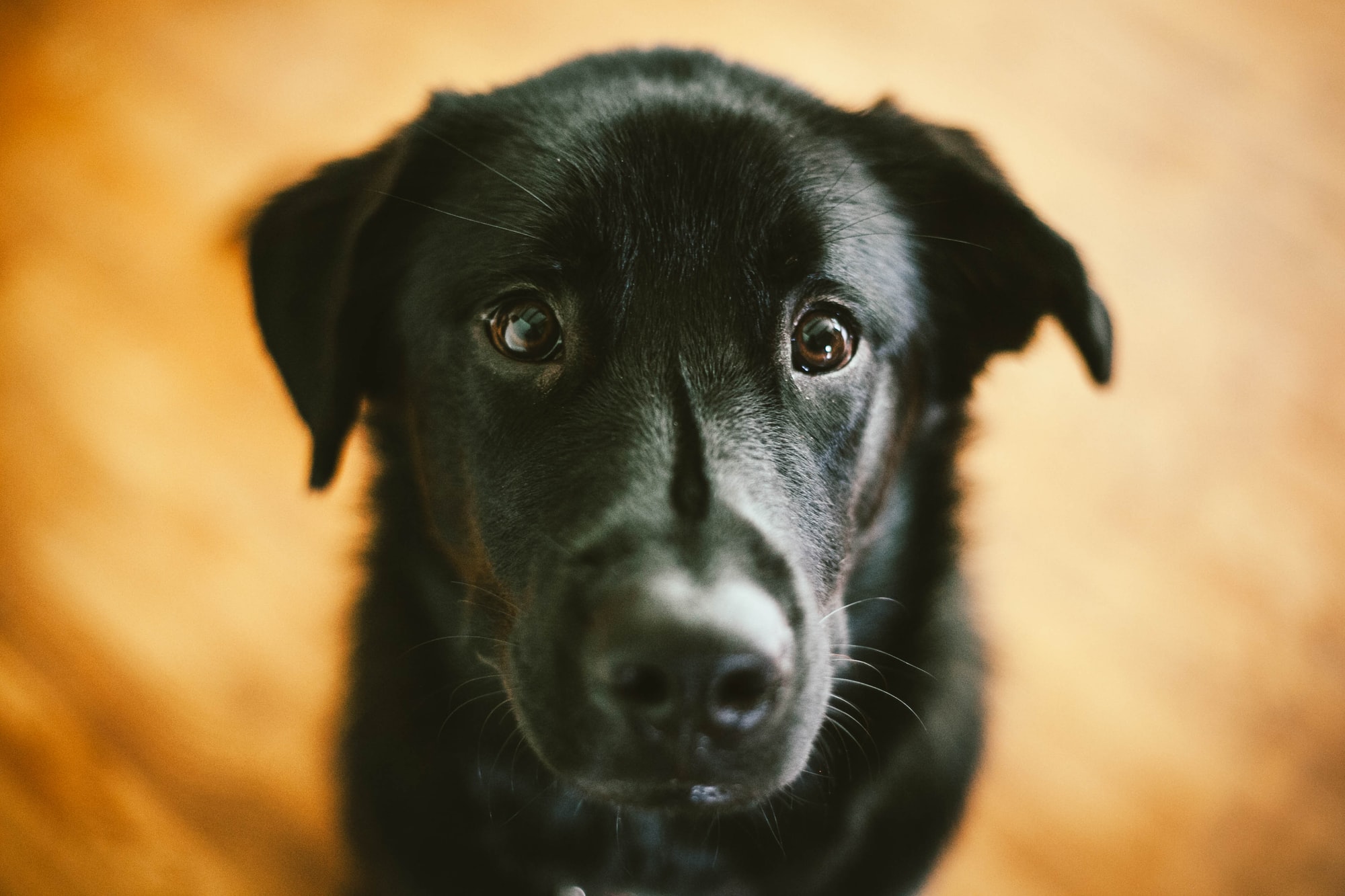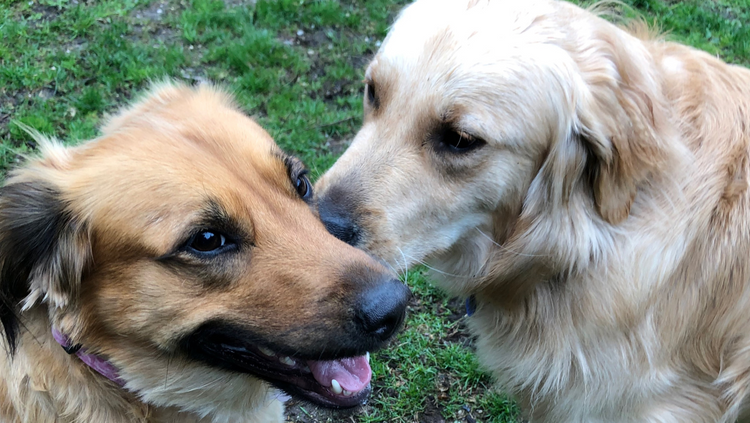Are Black Dogs More Aggressive? Black Dog Syndrome FACTS
Have you heard of "Black Dog Syndrome" before? It is not a terrible sickness and is not transmittable, despite its presentation. When it comes to adopting dogs from shelters, a disturbing trend has emerged: black-colored dogs are usually ignored. Sad, sad, sad..
I'm pretty sure that if you asked most people: "Which animal do you frequently associate with bad luck?", they'd say: "a cat"- common reaction. The legend says that a black cat crossing your path is a sign of bad luck. Witches are frequently represented as black cats in folklore when carrying out their malicious plans against people. Dogs, on the other hand, have a long history of being associated with both good and bad luck.
Many experts, as well as regular dog owners, are well conscious that black dogs do not necessarily grab attention due to their color or "notoriety".
They are frequently the first to be euthanized, but the last to be adopted. Even those looking for a dog to adopt prefer ones that are light in color, such as white, brown, reddish, or similar shades.
For a variety of reasons, some people automatically perceive black dogs as misfits. One of them is that some people believe black dogs are more aggressive than white dogs.
Yellow dogs were rated as the friendliest, brown dogs as the second friendliest, and black dogs as the least friendly. Similarly, darker pets were perceived as less desirable, while black dogs were considered the most aggressive.
In continuation of this article you'll find more about the black dog syndrome, why are black dogs less likely to be adopted, black dog adoption statistics, and why black dogs are the best companions.
Black Dog syndrome
Facts, myths, theories
What is Black Dog syndrome?
Black dog syndrome is a phenomenon where black dogs are passed over for adoption in favor of dogs with a lighter color. BBD, or big black dog, is a name used by animal shelters to denote a larger dark-colored mixed-breed that is claimed to be passed over by adopters. Black cats have also been shown to be affected by the same effect.
A lot of variables could be to blame for the phenomena. Geographic location, fear and prejudice against specific breed types, and the fact that large, black dogs are frequently represented as aggressive in film and television have all been found as probable connections in many pieces of research.
Why are some people afraid of black dogs?
Black dogs tend to be prejudiced for the following reasons:
- Coat black color is not seen well among the general population. Brighter coats are preferred by some since they are more noticeable.
- Many black dogs have a reputation for being dangerous and aggressive. Pit bulls, Doberman Pinschers, German Shepherd, and Rottweilers are just a few examples. If you want to know more, I've written an article about the most aggressive dog breeds that you may find interesting.
- The majority of owners have difficulty reading a black dog's expression and determining what it wants.
- They may be difficult to see at night or in poorly lit areas due to their black color. This can be inconvenient if they become disoriented or run away in the middle of the night. Because few people will see them, it can also be harmful to them and others. Another concern is that during certain hours, they may attack people or be hit by rushing vehicles.
- In popular culture, black dogs are associated with the negative stereotypes of being the "bad guy" and being violent.
- Black has traditionally been the color most usually associated with negativity, evil, and misery, for the reasons stated above. As a result, some people believe that black dogs bring bad luck (regarding what I've said in the introduction).
Black dog adoption statistics

In a 1998 research of 1,468 abandoned dogs waiting to be adopted at a local humane organization, having a mostly black coat color was related to euthanasia, while gold, gray, and white coat colors were found to be significant indicators of a successful adoption.
Stanley Coren PhD., DSc, FRSC on Psychology Today, made a study upon black, brown, and bellow Labs. The goal was for individuals to communicate their sentiments towards dogs that simply differed in color. The majority of the people he tested were students and employees at his university - a total of 60 people were tested.
Labrador Retrievers were chosen as the target breed because they come in three colors: black, brown, and yellow. He used three images of the dog's heads, one for each color, against similar backgrounds and in similar positions, all with the dog's mouth closed.
The dog pictures were displayed in random order on a computer screen. For each photo, the observers were asked four questions: how much they liked the dog's appearance, how friendly they thought it was, how suitable a family pet it would be, and how likely the dog would be aggressive. On a scale of 1 to 7, the responses were rated and I think you already imagine the answer. 🙃
The observers apparently believe that black dogs are less attractive, less friendly, and less likely to make suitable pets than brown or yellow dogs. Maybe even more importantly, black dogs are thought to be more aggressive than brown or yellow dogs. All of these differences were statistically significant.
Although the differences between brown and yellow dogs are not as significant, yellow dogs appear to be more preferred in all circumstances.
The truth about black dogs

Instead of searching for negative facts about black dogs, people should look for why black dogs are the best companions because the color of a dog doesn't represent the level of aggressivity, maliciousness, or violence.
Black dogs are beautiful, innocent, playful, smart, and obedient as light-colored dogs are. There are many popular black dog breeds like Labrador Retrievers or German Shepherds that impress by their coat and will surely win your heart.
The facts that black dogs are more aggressive or other superstitions about luck are just a myth. Black dogs are the same as white dogs, yellow dogs, and their derivates.
When considering adoption, people should focus on a dog's temperament more than its appearance. Some dogs, even though they don't appear to be as attractive as others, can make fantastic adoptees who are friendly and non-aggressive. People should not judge a dog focused on its appearance. Personality significantly matters more than appearance. It's like comparing a brunette with a blonde. Both have their own beauty and personality.
If you are going to adopt/get a black puppy, be sure you get inspired by my latest article about the best black dog names and choose the perfect name for your pooch.
I will end this article by showing you some black cuteness I follow on Instagram:
Really scary and aggressive, huh? 😅 You can follow them if you want! I follow @nala_the_needy_rottie (simply love those Rotties) for a while and recently @blacklabradorbruno (I couldn't resist his cuteness). When I made this article I found @gettoknow_noah_rani and @theblackgsd_nala and it was pure love at the first sight.
Hope you enjoyed this article! Love and paws until the next article! 🐾
FAQ:
What is wrong with black dogs?
Nothing is wrong with black dogs. They are exactly the same as lighter-colored ones. This black dog stereotype is called Black Dog Syndrome and because of it, black dogs are less adopted and first to be euthanized.
Are black dogs more intimidating?
According to some research, black dogs are more intimidating than dogs of other colors. Adopters may ignore black dogs because of a fear stereotype associated with particular breed types, such as pit bulls. Big, black dogs are sometimes portrayed as aggressive and intimidating in movies and television.
Are black Labradors aggressive?
Fortunately, Labradors are not known to be aggressive dogs. Actually, they are generally known for having a friendly and easy-going personality, which makes them such great family dogs. There is no evidence that black or chocolate-colored Labs are more overactive or aggressive than yellow ones. Like most Labrador Retrievers, the black Lab disposition is described as being extremely family-friendly, lively, active, and sociable. The black Labrador is well-liked by children of all ages and is reported to get along with other canines and household pets.

![10 Curly-Haired Dog Breeds: From Small to Large [2023 List]](../content/images/size/w750/2021/06/poodle1-3.jpg)


![5 TOP New Year's Resolutions for DOGS [2023]](../photo-1610632215073-0914404ff012-crop-entropy-cs-tinysrgb-fit-max-fm-jpg-ixid-MnwxMTc3M3wwfDF8c2VhcmNofDR8fGRvZyUyMG5ldyUyMHllYXJ8ZW58MHx8fHwxNjcyMzkyNjMz-ixlib-rb-4.0.3-q-80-w-750.jpg)